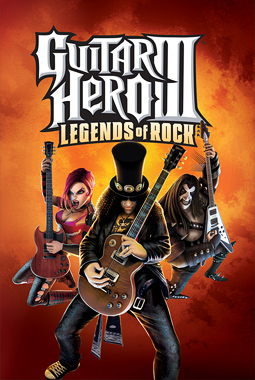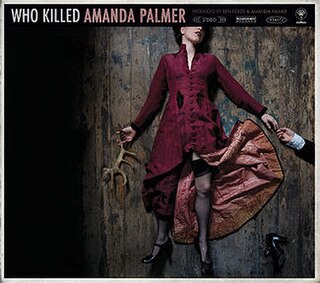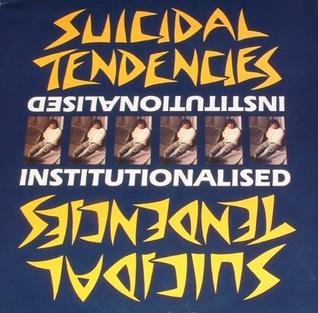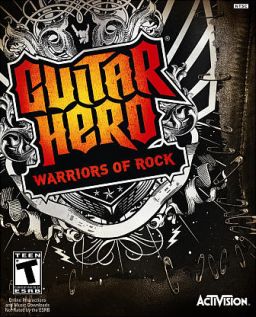
East Bay Ray is the stage name of Raymond John Pepperell, an American musician and guitarist for the San Francisco Bay area-based punk band Dead Kennedys. His guitar work was influenced by jazz and rockabilly. Alongside Jello Biafra's astute lyrics and unique vibrato-based vocal style, East Bay Ray's playing was one of the defining factors of the music of the Dead Kennedys, and by extension, of the "second wave" of American punk. He is also the only Dead Kennedy to remain a constant member of the band since its formation.

Amanda MacKinnon Gaiman Palmer is an American singer, songwriter, musician, and performance artist who is the lead vocalist, pianist, and lyricist of the duo The Dresden Dolls. She performs as a solo artist and was also a member of the duo Evelyn Evelyn, and the lead singer and songwriter of Amanda Palmer and the Grand Theft Orchestra. She has gained a cult fanbase throughout her career, and was one of the first musical artists to popularise the use of crowdfunding websites.
Brave New World is a 1932 novel by Aldous Huxley.
"Mother" is a song by Pink Floyd. It appears on The Wall album, released in 1979.
An astronaut is a person trained by a human spaceflight program to command, pilot, or serve as a crew member of a spacecraft.
Guitar Hero is a series of music rhythm game video games first released in 2005, in which players use a guitar-shaped game controller to simulate playing primarily lead, bass guitar, and rhythm guitar across numerous songs. Players match notes that scroll on-screen to colored fret buttons on the controller, strumming the controller in time to the music in order to score points, and keep the virtual audience excited. The games attempt to mimic many features of playing a real guitar, including the use of fast-fingering hammer-ons and pull-offs and the use of the whammy bar to alter the pitch of notes. Most games support single player modes, typically a Career mode to play through all the songs in the game, as well as competitive and cooperative multiplayer modes. With the introduction of Guitar Hero World Tour in 2008, the game includes support for a four-player band including vocals and drums. The series initially used mostly cover versions of songs created by WaveGroup Sound, but most recent titles feature soundtracks that are fully master recordings, and in some cases, special re-recordings, of the songs. Later titles in the series feature support for downloadable content in the form of new songs.
Heroes or Héroes may refer to:

Guitar Hero III: Legends of Rock is a music rhythm video game developed by Neversoft and published by Activision. It is the third main installment in the Guitar Hero series, following Guitar Hero II. It is the first game in the series to be developed by Neversoft after Activision's acquisition of RedOctane and MTV Games' purchase of Harmonix, the previous development studio for the series. The game was released worldwide for the PlayStation 2, PlayStation 3, Wii and Xbox 360 in October 2007, with Budcat Creations assisting Neversoft on developing the PlayStation 2 port and Vicarious Visions solely developing on the Wii port respectively. Aspyr published the Microsoft Windows and Mac OS X versions of the game, releasing them later in 2007.

Who Killed Amanda Palmer is the first solo studio album by American singer-songwriter Amanda Palmer. The album was largely recorded in Nashville, Tennessee, with collaborator Ben Folds and was released on Roadrunner Records. The name of the album is a reference to the series Twin Peaks, which revolves around events surrounding the death of Laura Palmer.

"Institutionalized" is the debut single by American hardcore punk/crossover thrash band Suicidal Tendencies. It was released in 1983 as the only single from their self-titled debut album. "Institutionalized" is one of the band's most popular songs and has remained a live staple since it was first played in 1982. The song was re-recorded on the band's 1993 album Still Cyco After All These Years; this version was nominated for the Grammy for Best Metal Performance in 1994, but lost to Ozzy Osbourne's live version of "I Don't Want to Change the World".

Guitar Hero: Metallica is a 2009 music rhythm video game developed by Neversoft and published by Activision. The game was released in North America on the PlayStation 3, Wii, and Xbox 360 on March 29, 2009, and on PlayStation 2 on April 14, 2009, with an Australian and European release in May 2009. It is the second game in the Guitar Hero series to focus on the career and songs of heavy metal band, Metallica, following Guitar Hero: Aerosmith.

The Dresden Dolls are an American musical duo from Boston, Massachusetts. Formed in 2000, the group consists of Amanda Palmer and Brian Viglione. The two describe their style as "Brechtian punk cabaret", a phrase invented by Palmer because she was "terrified" that the press would invent a name that "would involve the word gothic". The Dresden Dolls aesthetic exemplifies dark cabaret.

Guitar Hero 5 is a 2009 music rhythm video game developed by Neversoft and published by Activision. It is the fifth main installment in the Guitar Hero series. The game was released internationally in September 2009 for the PlayStation 2, PlayStation 3, Wii and Xbox 360 consoles. Similar to the preceding title, Guitar Hero World Tour, Guitar Hero 5 is geared towards playing in a four-person band experience, including lead and bass guitar, drums, and vocals. The game is available as a standalone title, allowing players to use existing compatible instrument controllers, and as a bundle that provides these controllers. Guitar Hero 5 adds several new features, such as drop-in/drop-out play, bands composed of any combination of available instruments, a Rockfest competitive mode consisting of several various scoring mechanisms, and both song-specific and general Challenges to unlock new avatars, clothing, and other extras in the game. Many of these changes were added to make the game a more social experience, allowing players across a range of skill levels to be able to play cooperatively and competitively against each other both locally and online.

Guitar Hero is a series of rhythm video games published by Activision in which players use guitar-shaped controllers to mimic the playing of numerous rock music songs in a score attack gameplay; later games in the series have included support for drums and vocals and playing as a full band. With over $2 billion in total sales worldwide, the game series has made a significant cultural impact, becoming a cultural phenomenon and recognizable in the popular culture. The series has been found to influence younger players into learning real instruments and has found application within the health care industry to help recovering patients.

Guitar Hero: Warriors of Rock is a 2010 music rhythm video game developed by Neversoft and published by Activision. The sixth main installment in the Guitar Hero series following Guitar Hero 5. The game was released in September 2010 for PlayStation 3, Wii, and Xbox 360. Similar to previous entries in the franchise, it is geared towards playing in a four-person band experience, including lead and bass guitar, drums, and vocals. The game is available as a standalone title, allowing players to use existing compatible instrument controllers, and as a bundle that provides these controllers.

Theatre Is Evil is the second studio album by Amanda Palmer, and first with her band The Grand Theft Orchestra. It was released on September 7, 2012 in Australia, on September 10, 2012 in the United Kingdom and Europe, and September 11, 2012 in the United States and Canada. The album has been released by Palmer's own record label, 8 Ft. Records, with distribution handled by Cooking Vinyl in the UK and Europe, and Alliance Entertainment in the US.










